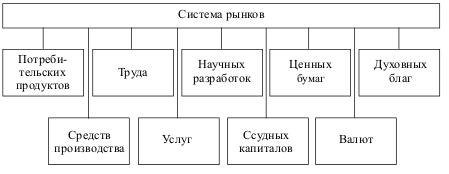System markets
System markets is a single set of a plurality of markets for various purposes. This set was formed under the influence of a number of factors.
Во-первых, в условиях индустриального и постиндустриального производства позволило значительно расширить рыночное пространство в следующих направлениях: натуральное производство в широких масштабах превр атилось в товарное хозяйство рабочая сила основной части трудящихся стала предметом купли-продажи быстро развилась сфера оплачиваемых духовных благ и услуг, результаты исследований (исследования и разработки) стала товаром .
Second, modern production creates a huge variety of useful benefits that meet the needs of comprehensively developed person.
Thirdly, the widespread development of joint stock companies has led to the fact that the shares and other securities are sold on a particular market of securities.
Fourth, the accelerated growth of international economic relations required the creation of a developed market for foreign currencies.
Finally, efforts in the second half of the XX century the social division of labor went beyond production and embrace market sphere. It has an specialized market that promotes particular products and services to their consumers.
Начали разрабатываться во второй половине нынешнего столетия рынок немыслим без системы разделения труда в сфере обращения (купли-продажи). Последние проявляются в основных видах экономической деятельности: общее (между крупными отраслями или сферами) и особенное (между подотраслями и видами торговых предприятий) разделение труда. Общее расчленение рынка наглядно представлено на рисунке ниже:

В системе рынков достаточно определенно разделить на следующие основные отрасли:
рынок потребительских продуктов (он подразделяется на множество подотраслей, реализующих продовольственные и непродовольственные блага, рынок жилья и т. д.)
рынок средств производства (приобрела материальные факторы производства: оборудование, транспортные средства, здания, сооружения, сырье, материалы, топливо, электроэнергию и т. д.) рынок услуг (который включает в себя разнообразные виды коммунального и бытового обслуживания, финансовые и страховые операции, коммерческие, социальные, культурные, духовные и иные услуги) на рынке труда (работодатели и работники)
на рынок научных и эскизной проработке выход (продукция научных исследований, подготовлены к освоению в производстве)
рынок капитала (купли-продажи временно свободных денежных средств, используемых для производственных целей), ценных бумаг (акции, облигации, и иные документы, доход), валютном рынке (национальные и международные учреждения, через которые производятся покупка, продажа, обмен иностранной валюты, и денежные расчеты с другими государствами) рынок духовных благ (купли-продажи продуктов интеллектуальной деятельности ученых, писателей, художников и т. д.)
Broad and deep development of market relations is extremely increased their economic role. The market ensures the production of the totality of the subjective, material, scientific-technical, intellectual and financial conditions for the development. All the major manufacturing industries are highly dependent on the specialized market exposure. Not coincidentally, the national economy has received the name of a market economy. This is not denied in General the value of commodity production. We are talking only about the new state of the economic organism when all its cells are exposed to market relations.
In the second half of the XX century the development of each national system of market relations got a new dimension. Now distinguish between closed and open national economy. Closed economy is characterized in that all the goods and services produced and consumed within the country. Open is the economy, which of the products created for domestic consumption and the remaining part is sold abroad. However, the state buys goods and services produced in other countries.
The transition from a closed to an open economy is associated with the development of forms and types of interactions participants in both national and global markets.